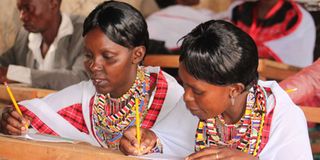100 Maasai women graduate in adult learning programme

Adult education learners attend a lesson at Olepolos Primary School in Kajiado County.
What you need to know:
- The women, aged between 50 and 70 years, took classes in languages and arithmetic.
- Jubilant graduands said lack of education in their early years condemned them into poverty and has denied them many opportunities in life.
At least 100 Maasai women from Kajiado County who had enrolled for adult learning graduated on Monday after a three month training.
The women, aged between 50 and 70 years, took classes in languages and arithmetic.
The classes were, however, interrupted by the Covid-19 pandemic but the women had already sat for exams waiting to graduate.
The adult literacy programme was funded by the County Government of Kajiado in collaboration with local NGOs.
Jubilant graduands said lack of education in their early years condemned them into poverty and has denied them many opportunities in life.
Some said their lack of education also exposed them to retrogressive cultural practices such as Female Genital Mutilation and early marriages.
One of the graduands, Lilian Kirelo, said life as an illiterate women was difficult and she had no power to make decisions.
Adult classes
“Life of an illiterate Maasai woman in the village is full of challenges. Those in bead-work rely on interpreters to negotiate prices with foreign customers. We herd but we cannot count our livestock and often we are duped by people who take advantage of our illiteracy,” she said.
With the changing trend, and with scores of women becoming enlightened, the women vowed to continue encouraging fellow women to join the programme and take up adult classes.
Education CEC Jeremiah Ole Njaro said though adult education is not devolved, his department has been facilitating tutors.
Kajiado Governor Joseph Lenku who graced the graduation ceremony lauded the programme saying his administration has allocated Sh40 million in the current financial year to enrol more adult learners.
He urged the community to shun retrogressive cultures that are counterproductive to formal education.
“Retrogressive cultures have seen our community lag behind in formal education. We have put up a raft of measures to ensure more adults enrol for classes in a bid to eradicate illiteracy levels among adults,”he said.
High illiteracy levels
The governor also emphasised on the need to enrol children who have attained school-going age into Early Childhood Development Education (ECDE) classes.
“There is need to get more children in school at an early age and ensure retention in a bid to address high illiteracy levels in the county,” he said, adding that his government is committed to support learners access quality education.
According to statistics from the Ministry of Education, illiteracy in Kthe county stands at 49.8 per cent.
Access to education in Kajiado is complicated by poor infrastructure, rural tradition and circles of poverty.
According to the ministry, primary school enrolment remains above 65 per cent however, this percentage goes down as the individual progresses to higher level.
The number reduces by up to 30 per cent upon reaching higher education.
In 2018, male enrolment stood at 3,414 students against 6,015 female students’ enrolment. In 2019, the numbers significantly dropped to a total enrolment of 3,179 students.
This year, education experts say, the numbers are expected to drop further due to the Covid-19 pandemic that has interruption the school calendar.




